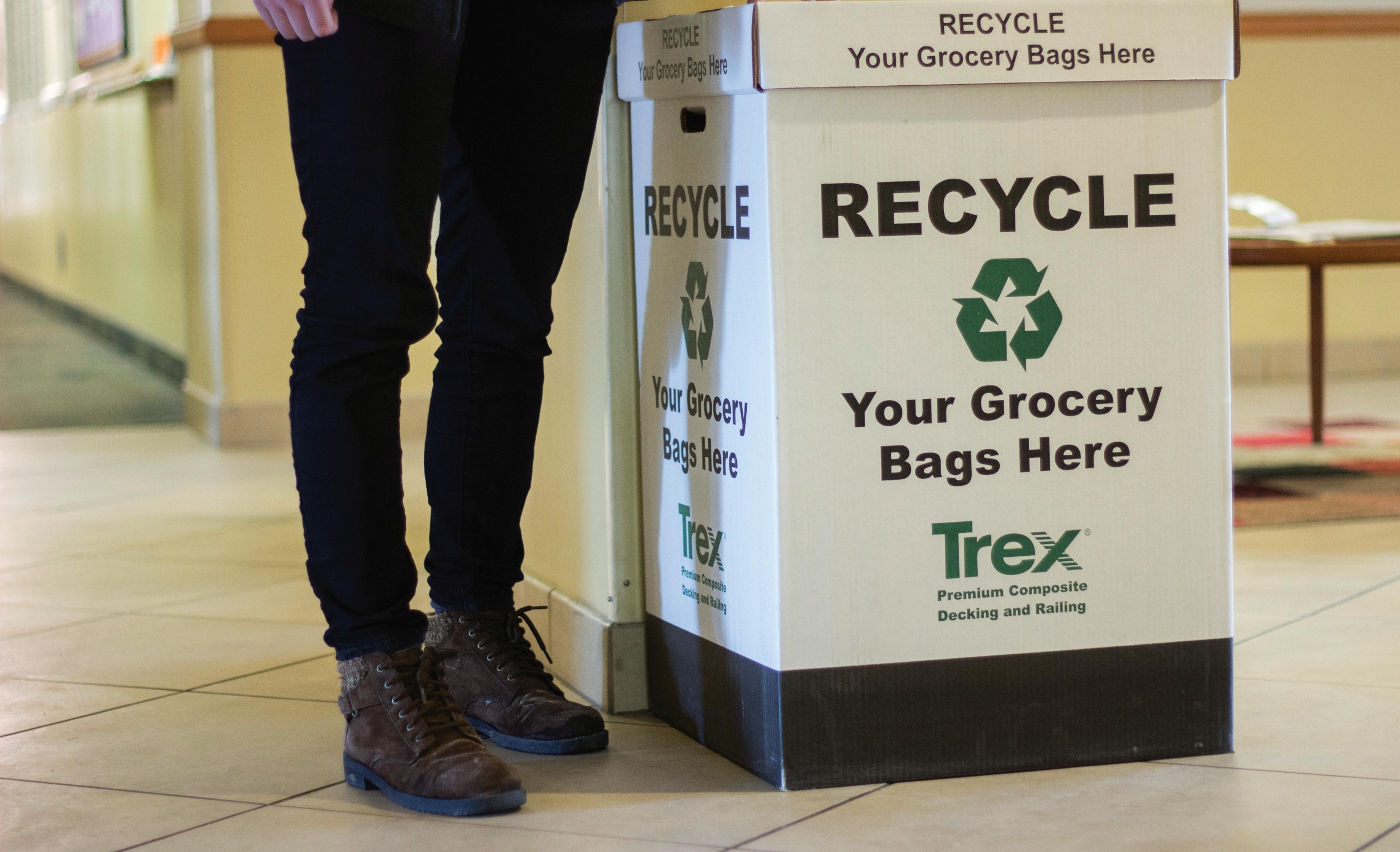Sustainability club needs 1,000 pounds of plastic bags
It takes 1,000 years for a single plastic grocery bag to biodegrade, according to the Students for Sustainability Club, which is why they’re taking action on campus by facilitating the Plastic Bag Recycling Challenge.
Not only can students get rid of the cache of grocery bags under their kitchen sinks, but their effort could help USU receive a new bench made from recycled materials. Trex, a composite decking company that sponsors the competition for college and university campuses around the country, will donate the bench if USU can collect 1,000 pounds by Earth Day, which is April 22.
“Currently the university doesn’t have the facilities to recycle those bags at the recycling center,” said Alexi Lamm, USU’s sustainability coordinator. “So people needed to take those bags back to the grocery stores, which do accept them, or they were throwing them away, or reusing them in their home. This provided another option for people who have those bags around to recycle them.”
Each area of on-campus housing has a bin, including the Living Learning Center Building A, Merrill Hall, the Lundstrom Student Center and others. A bin is also placed at the campus recycling center, located near Parking and Transportation Services.
Club president Jacoby Knight said student participation thus far has been more than anticipated. About 60 pounds of grocery bags have already been sent to be recycled.
“We were actually surprised,” Knight said. “In December, when no one was up here, we collected about 25 pounds, which is pretty good. It filled my whole car.”
But students still have a long way to go, Lamm said.
“Of course we don’t want to encourage people to take more from the store, but for anyone who has them sitting under their kitchen counter somewhere, or in a drawer, we can definitely use more,” she said. “I think we’re a little behind where we’d like to be in order to get the bench.”
To convenience students living off campus, the club goes door-to-door to two apartment buildings a month, asking students for their bags.
“We’ve noticed that this program is catered more to students that live on campus,” Knight said. “This just makes it easier for people and it gets the word out about what we’re doing as a club and what they can do to help us reach our goal.”
The bin at the recycling center is another, perhaps more convenient, option for off-campus residents.
“I know some students drive up to the recycling center because they have a drop off area,” Lamm said. “But, if you’re up on campus anyway, there are drop-offs in most of the buildings.”
Viviane Baji, a sophomore majoring in environmental economics and a member of Students for Sustainability, said the competition is a great way for students to learn about the club and get involved. Knight said the club only had three members last year, and has grown to about 14 or 15 this year.
“I think we’re pretty excited because people finally know what to do with the plastic bags that just pile up over time,” Baji said. “People always have closets in their house chalked full of bags, so when we tell people what we’re doing, they run home and bring back piles and piles.”
More importantly, Knight hopes the program will educate students to stop using plastic and switch to a more sustainable system.
“We’re kind of undercutting ourselves,” he said. “We’re telling people to recycle their bags, and we want them to recycle, but at the same time, we’re educating them not to use plastic bags. We want to have this plastic bag recycling program on campus for this year and maybe the year to come, but in the future, we’ll want to stop having it and have students use reusable bags.”
Baji said she prefers to shop with reusable bags, and not just to reduce her “overall carbon footprint.”
“I think it’s a lot more convenient,” she said. “You can pack a lot more into them than the plastic ones and they’re a lot sturdier; you don’t have to worry about them ripping open … It’s just a matter of remembering to bring them.”
Reusable shopping bags should be the first choice when trying to be environmentally conscious in your shopping, Lamm said, but people usually end up with the plastic anyway. Using them as trash-can liners is better than sending them straight to the trash, she said, but people often end up with more than they actually need for reuse.
“Plastic bags are made from oil, which is a non-renewable resource, so I feel like we want to use that resource as efficiently as possible,” Lamm said. “And using it on plastic bags that we’re throwing into the landfill probably isn’t the best. If you’re going to use the bags, which a lot of people do, then recycling them is a good idea because you don’t have to use the new virgin resources to create them again. If people are throwing them away instead of recycling, they take a long time to break down in the environment.”
For more information on how to get involved with Students for Sustainability, visit sustainability.usu.edu.

